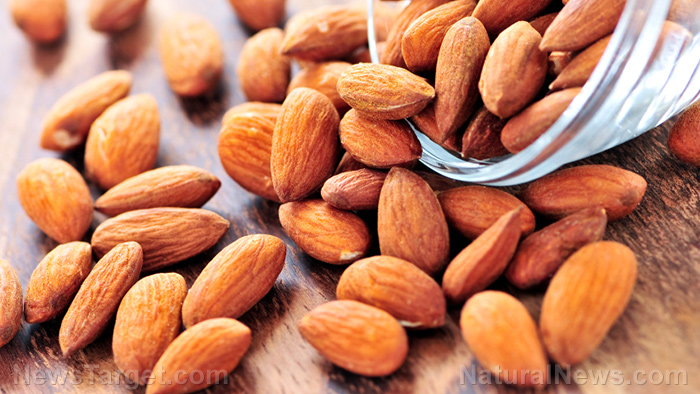Take better care of your heart by eating more almonds
01/28/2019 / By Michelle Simmons

Almonds, like other types of nuts, are ideal snacks – they contain various nutrients and are low in fat. Studies have shown that almonds can also help in maintaining healthy blood lipid levels. In a review published in the Journal of Nutritional Science, researchers reviewed studies on almond consumption and blood lipid levels and found that eating almonds can improve cholesterol and triglyceride levels.
Researchers from Canada reviewed 18 published randomized controlled trials with a total of 837 participants to determine the effects of almond consumption on blood lipid levels, such as total cholesterol, low-density lipoprotein (LDL) or “bad” cholesterol, high-density lipoprotein (HDL) or “good” cholesterol, and triglycerides.
The review systematic review and meta-analysis revealed that eating almonds can greatly reduce total cholesterol, LDL cholesterol, and triglyceride levels. However, almond consumption did not affect HDL cholesterol levels. (Related: Eating almonds found to accelerate the body’s mechanism for eliminating high cholesterol.)
Data gathered from all studies showed that there was a 0.153 millimoles per liter (mmol/L) decrease in total cholesterol. Among participants who consumed at least 45 grams (g) of almonds per day, a 0.212 mmol/L decrease in total cholesterol was seen. Furthermore, those who have high levels of total cholesterol and consumed at least 45 g of almonds every day experienced a 0.271 mmol/L in total cholesterol. These results indicate that the effects of almonds on total cholesterol levels are the greatest in people with elevated total cholesterol.
The researchers observed a similar pattern in LDL cholesterol. Data collected from all studies indicated that almond consumption reduced LDL cholesterol by 0.124 mmol/L. Moreover, consuming at least 45 g of almonds resulted in a 0.132 mmol/L decrease in LDL cholesterol. In participants with elevated LDL cholesterol levels, eating at least 45 g of almonds every day resulted in a 0.158 mmol/L decrease in LDL cholesterol.
These results support the claim that consumption of nuts lowers the risk of heart disease. With these findings, the researchers suggested that almonds, and other types of nuts, should be part of a healthy diet to maintain healthy blood lipid levels and to lower the risk of heart disease.
More snacks to keep your heart healthy
Here are other heart-healthy snacks you may want to try:
- Carrots, cucumbers, and celery sticks with hummus: This combination is a great way to get your family to eat more vegetables. Carrots, cucumbers, and celery sticks are low in cholesterol, fat, calories, and sodium, while hummus provides fiber, protein, and antioxidants — all of which are excellent in protecting against cardiovascular disease.
- Fruits: Fruits, whether as a whole or made into smoothies, are great for your heart. Eating a piece of whole fruit such as an apple, peach, pear, or a bunch of grapes will help reduce your cholesterol levels and satisfy your sweet tooth at the same time. You can make a smoothie from fresh or frozen fruits like bananas, berries, mango, peaches, or pineapple, then add a scoop of soy protein powder.
- Oatmeal: While oatmeal is commonly eaten as a breakfast food, you can eat it anytime. Oatmeal is rich in soluble fiber, which can make you feel full and help lower your cholesterol levels. Soluble fiber works by soaking up cholesterol and helping the body eliminate it through the digestive system.
- Soy protein: Research has shown that soy protein can help lower cholesterol levels. You can try snacking on edamame beans – be it fresh, cold, hot, or dried.
Read more news stories and studies on foods that enhance heart health by going to ReverseHeartDisease.news.
Sources include:
Tagged Under: almonds, cardiovascular conditions, cardiovascular disease, cardiovascular health, cholesterol, heart attack, heart disease, heart health, lipids, nuts



















